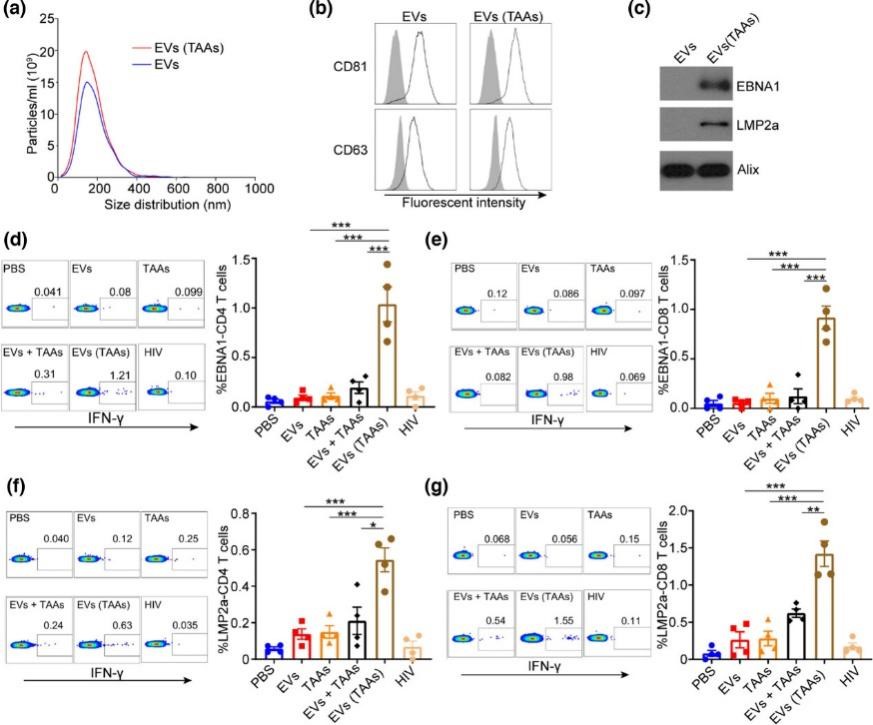Gamma delta (γδ) T cells are a type of innate-like T cell that possess dual anti-tumor activities, capable of directly eliminating tumor cells and acting as immunostimulatory cells to enhance the body’s anti-tumor immunity. In a recent research report titled “Tumor vaccine based on extracellular vesicles derived from γδ-T cells exerts dual antitumor activities” published in the international journal Journal of Extracellular Vesicles, scientists discovered that extracellular vesicles (exosomes) derived from γδ-T cells not only exhibit direct anti-tumor effects but also, if developed into a tumor vaccine, can effectively induce tumor-specific immune responses. This discovery may provide a new pathway and ideas for the development of novel cancer therapies.
Extracellular vesicles are nanoscale particles secreted by cells, typically carrying a variety of substances such as lipids, proteins, and nucleic acids, and playing a crucial role in intercellular communication. They can protect vaccine components from degradation, thereby enhancing their stability and prolonging their half-life, and can enhance the uptake of antigens by antigen-presenting cells (APCs), thus potentially being explored for the development of tumor vaccines. Previous research has focused on exosomes from tumor cells (TExos) and dendritic cells (DC-Exos), but they have certain limitations in terms of safety and clinical efficacy.
In this study, researchers focused on extracellular vesicles derived from human γδ-T cells, a rare subtype of T cells known for their direct anti-tumor activity and ability to enhance T cell responses. They found that the extracellular vesicles derived from γδ-T cells (γδ-T-Exos) exhibit dual anti-tumor activities, carrying cytotoxic and immunostimulatory molecules and capable of directly killing tumor cells and stimulating the host’s immune system. Researchers discovered that γδ-T-Exos have a certain adjuvant effect, enhancing the expression of antigen presentation and releasing pro-inflammatory molecules, thereby improving the immune system’s ability to recognize and attack tumor cells.

See our exosome vaccine service:
By loading γδ-T-Exos onto tumor-associated antigens to develop a tumor vaccine, researchers demonstrated that it could potentially be more effective in promoting the body’s tumor-specific T-cell responses than using γδ-T-Exos alone. This vaccine strategy also retains direct anti-tumor effects and can induce tumor cell death. Interestingly, the study findings suggest that allogeneic γδ-T-Exos (derived from different individuals) can exhibit similar preventive and therapeutic effects in mouse models as autologous γδ-T-Exos (derived from the same individual). This indicates that this method might be suitable for centralized standard production, and these vaccines also possess dual anti-tumor capabilities, effectively killing tumor cells and indirectly inducing T-cell-mediated anti-tumor immune responses, thereby controlling tumors better than existing vaccine strategies.
Researcher Tu Wenwei stated that this study first revealed the adjuvant effect of γδ-T-Exos and its ability to effectively induce tumor-specific T-cell responses when used in tumor vaccines; in various mouse models, vaccines based on γδ-T-Exos could effectively control the occurrence and progression of tumors. More importantly, vaccines based on allogeneic γδ-T-Exos show similar anti-tumor effects as those based on autologous γδ-T-Exos. Therefore, γδ-T-Exos derived from healthy donors might be used to treat patients with allogeneic tumors, greatly promoting the clinical promotion and application of new therapies.
The study results are of significant importance for cancer immunotherapy, with the adjuvant effect observed in γδ-T-Exos emphasizing their potential as cancer vaccines because they can also effectively deliver tumor antigens while having dual anti-tumor effects, surpassing the efficacy of DC-Exos-based vaccines. Furthermore, vaccines based on allogeneic γδ-T-Exos also show promise in clinical practice, as they simplify the preparation process of personalized vaccines and allow for standardized production. These findings hope to improve cancer treatment outcomes by providing a more simplified and accessible approach. Overall, this study provides a certain level of conceptual validation for the use of allogeneic γδ-T-Exos-based vaccines in cancer control.
Reference:
Wang, Xiwei, et al. “Tumor vaccine based on extracellular vesicles derived from γδ‐T cells exerts dual antitumor activities.” Journal of Extracellular Vesicles 12.9 (2023): 12360.
